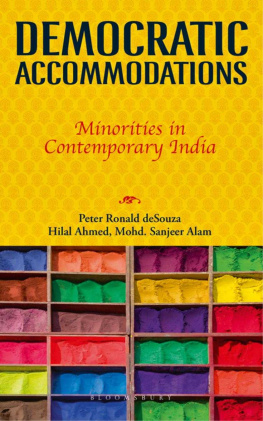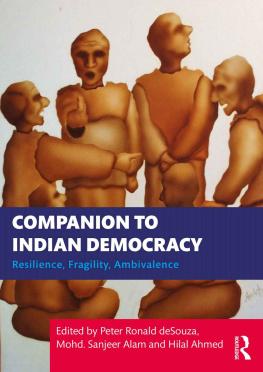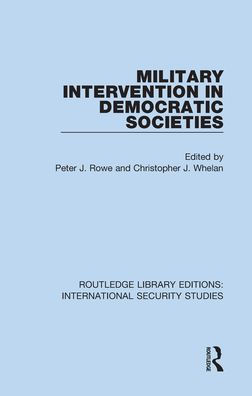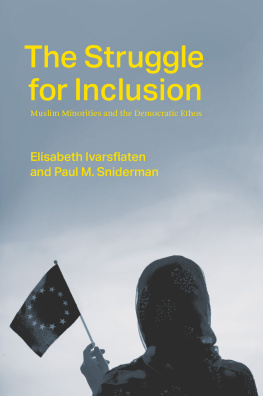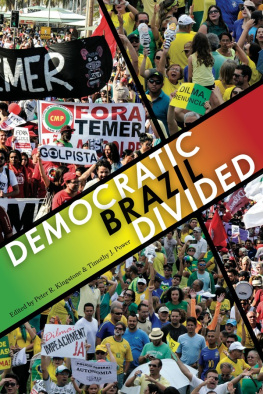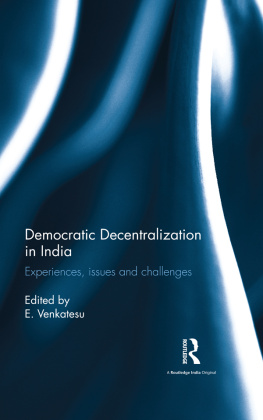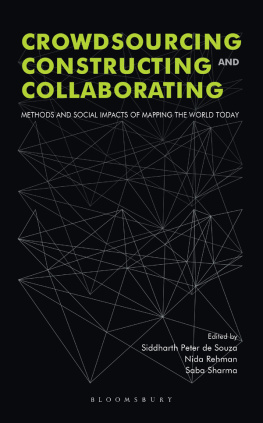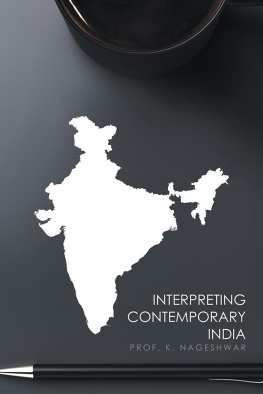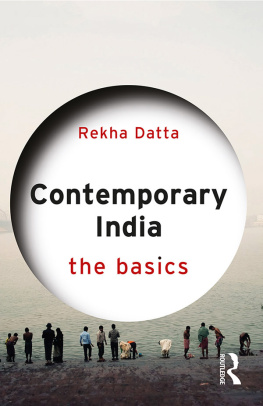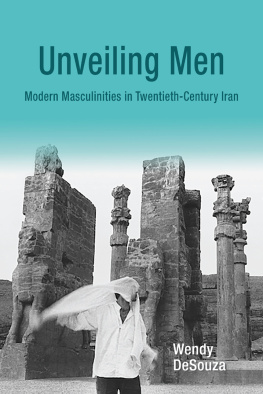Democratic Accommodations
Democratic Accommodations:
Minorities in Contemporary India
Peter Ronald deSouza
Hilal Ahmed
Mohd. Sanjeer Alam

BLOOMSBURY INDIA
Bloomsbury Publishing India Pvt. Ltd
Second Floor, LSC Building No. 4, DDA Complex, Pocket C 6 & 7,
Vasant Kunj New Delhi 110070
BLOOMSBURY, BLOOMSBURY ACADEMIC INDIA and the Diana logo are trademarks of
Bloomsbury Publishing Plc
First published in India 2019
This edition published 2019
Copyright Bertelsmann Stiftung, 2019
Peter Ronald deSouza, Hilal Ahmed, Mohd. Sanjeer Alam have asserted their right under the Indian Copyright Act to be identified as Authors of this work
Bloomsbury Academic
An imprint of Bloomsbury Publishing Plc
All rights reserved. No part of this publication may be reproduced or transmitted in any form or by any means, electronic or mechanical, including photocopying, recording, or any information storage or retrieval system, without prior permission in writing from the publishers
Bloomsbury Publishing Plc does not have any control over, or responsibility for, any third-party websites referred to or in this book. All internet addresses given in this book were correct at the time of going to press. The author and publisher regret any inconvenience caused if addresses have changed or sites have ceased to exist, but can accept no responsibility for any such changes
ISBN: HB: 978-9-3884-1454-8; eBook: 978-9-3884-1456-2
2 4 6 8 10 9 7 5 3 1
Created by Manipal Digital Systems
Bloomsbury Publishing Plc makes every effort to ensure that the papers used in the manufacture of our books are natural, recyclable products made from wood grown in well-managed forests. Our manufacturing processes conform to the environmental regulations of the country of origin.]
To find out more about our authors and books visit www.bloomsbury.com
and sign up for our newsletters
To
Jawaharlal Nehru, who established the architecture for a plural and inclusive India
Contents
Scholarships to Students Belonging to Minority
Communities: All India |
Free Coaching and Allied Schemes for Candidates
Belonging to Minority Communities |
| AIMMM | All India Muslim Majlis-e-Mushawarat |
| AIMPLB | All India Muslim Personal Law Board |
| BJP | Bharatiya Janata Party |
| BMMA | Bharatiya Muslim Mahila Andolan |
| CA | Constituent Assembly |
| CABE | Central Advisory Board of Education |
| CAD | Constituent Assembly Debate |
| CBCI | Catholic Bishops Conference of India |
| CMP | Common Minimum Programme |
| CP | Central Provinces |
| CPI | Communist Party of India |
| FGM | female genital mutilation |
| JUH | Jamiat Ulema-e-Hind |
| MCD | Minority Concentrated District |
| MHRD | Ministry of Human Resource Development |
| MoMA | Ministry of Minority Affairs |
| MsDP | Multi-sectoral Development Programme |
| NCF | National Curriculum Framework |
| NCM | National Commission for Minorities |
| NCMEI | National Commission for Minority Educational Institutions |
| NCRLM | National Commission for Religious and Linguistic Minorities |
| NIC | National Integration Council |
| NMDFC | National Minorities Development and Finance Corporation |
| NPE | National Policy on Education |
| NRC | National Register of Citizens |
| NSSO | National Sample Survey Organization |
| OBC | Other Backward Classes |
| RSS | Rashtriya Swayamsewak Sangh |
| SC | Scheduled Castes |
| SCR | Sachar Committee Report |
| SRC | States Reorganization Commission |
| ST | Scheduled Tribes |
| TG | transgender |
| UCC | Uniform Civil Code |
| UPA | United Progressive Alliance |
Indias attitude to and treatment of its minorities has several unusual features that distinguish it from other plural democracies. It recognises many languages. There are national holidays for different religions, a relatively rare event in other societies. Dress, food and other such markers of cultural identity provoke no controversy. Minorities are constitutionally recognised and given clearly defined rights and liberties that are in some cases greater than those of the majority. Indeed, while they are a constitutional presence, the majority is hardly mentioned in the Constitution and hovers over it as a kind of pervasive but vague presence. All this needs to be explained. I suggest that the explanation is to be found in the formation of the Indian state, its non-ideological character and its hospitality to diversity.
In Europe, the birth of the state was a pretty violent affair involving the dismantling of the existing communities, expelling aliens, suppressing dissidents and creating a homogeneous space for the newly emergent state based on the supremacy of the dominant ethnos. The latter defined the identity of the state, saw itself as its historical bearer and set the norms to decide what was to be tolerated in the practices of its citizens. India followed a different path. The colonial rule which consolidated and designed the shape of the new state after much violence by and large made its peace with the existing ethnic, religious and other communities and made them its partners. The state made its own laws but also recognised those obtaining in the various communities. At Independence India had little choice but to continue with the prevailing arrangements. It had to reassure its minorities that they would continue to enjoy broadly the same degree of freedom and autonomy after independence as before. Had it not done so it would have created an even greater chaos than that surrounded its violent birth.
There was also another dimension to the state formation in India. Unlike Europe where the state established its own independent identity and enjoyed unchallenged supremacy over other bodies, especially the religious and the ethnic, the Indian state shared its sovereignty with them. The state was superior to them all but not supreme or sovereign in the European sense. In certain clearly designated areas its authority was subject to their approval and could only be exercised in cooperation with them. The minorities were constitutional partners of the state, sharing its sovereignty and enjoying broadly the same foundational status.
Another factor also played an important part in giving the minorities dignity and status. From the nineteenth century onwards liberalism and democracy were the widely available bodies of thought in Europe. They had different origins and historical trajectories but they dealt with complementary areas of social and political life. They needed to be combined and that could be done in three ways, giving rise to three different kinds of political system. One might privilege liberalism, define democracy within its limits and establish a liberal or liberalised democracy as Hobbes, Locke, Kant and others did. Or one could do the opposite, allow democracy to set the limits of liberalism and arrive at democratic liberalism as Rousseau, de Tocqueville and other did. Or finally one could give them more or less equal importance, suitably reinterpret them and bring them into harmony as T.H. Green and other British idealists did.
Next page
